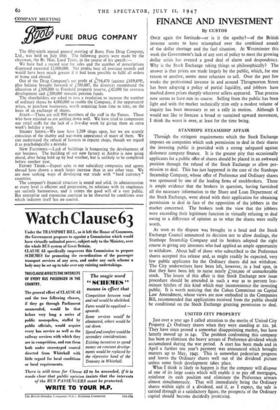FINANCE AND INVESTMENT
By CUSTOS
STANHOPE STEAMSHIP AFFAIR
Throtigh the stringent requirements which the Stock Exchange imposes on companies which seek permission to deal in their shares the investing public is provided with a strong safeguard against dishonest company finance. It is the greater pity that occasionally applicants for a public offer of shares should be placed in an awkward position through the refusal of the Stock Exchange to allow per- mission to deal. This has just happened in the case of the Stanhope Steamship Company, whose offer of Preference and Ordinary shares was sponsored by one of the leading firms of stockbrokers. There is ample evidence that the brokers in question, having furnished all the necessary information to the Share and Loan Department of the Stock Exchange, went ahead with their application for obtaining permission to deal in face of the opposition of the jobbers in the market concerned. The brokers took the view that the jobbers were exceeding their legitimate function in virtually refusing to deal owing to a difference of opinion as to what the shares were really worth.
As soon as the dispute was brought ' to a head and the Stock Exchange Council announced its decision not to allow dealings, the Stanhope Steamship Company and its brokers adopted the right course in giving any investors who had applied an ample opportunity to withdraw. About half of those who subscribed to the Preference shares accepted this release and, as might readily be expected, very few public applicants for the Ordinary shares did not withdraw. The City underwriters have been left, however, in a bad spot, in that they have been left to nurse nearly £7oo,000 of unmarketable stock. The lesson of this affair is that Stock Exchange new issue procedure should be amended in such a way as to prevent last- minute hitches of this kind which may inconvenience the investing public. It is worth noticing that the Cohen Committee on Capital Law Amendment, whose views are now embodied in the Companies Bill, recommended that applications received from the public should be conditional on the Stock Exchange granting permission to deal.
UNITED CITY PROPERTY
Just over a year ago I called attention to the merits of United City Property LI Ordinary shares when they were standing at 22s. 3d. They have since proved a somewhat disappointing market, but have latterly moved up to 245. The problem confronting this company has been to eliminate the heavy arrears of Preference dividend which accumulated during the war period. A start has been made and in April a further one year's payment was announced which brought matters up to May, 1945. This is somewhat pedestrian progress and leaves the Ordinary shares well. out of the dividend picture unless some fresh development .takes place.
What I think is likely to happen is that the company will dispose of one of its large assets which will enable it to pay off mortgages, reinforce its cash position and eliminate the Preference arrears almost simultaneously. That will immediately, bring the Ordinary shares within sight of a dividend, and if, as I expect, the sale is carried through at a satisfactory figure, the prospects of the Ordinary capital should become decidedly promising.


































 Previous page
Previous page